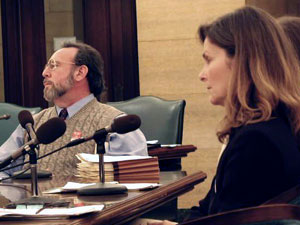|
Audio
Photos
More from MPR
|
 |
| PCA Commissioner Sheryl Corrigan appeared before a Senate committee to explain the agency's actions in a mercury reduction program. "There was no cover-up," she said. (MPR Photo/Art Hughes) |
St. Paul, Minn. — The hearing was triggered by discussions more than a year ago when the Pollution Control Agency was drafting proposals to limit smokestack emissions of mercury. At a key point in the process environmental groups found they could not get meetings with agency staff to discuss the proposals. Representatives of those groups learned later the agency was meeting with the Minnesota Chamber of Commerce, power companies and other industry groups. The proposals were significantly weakened afterwards.
Patience Caso with the Clean Water Action Alliance says agency officials repeatedly cancelled meetings.
"They said they could not meet with anybody outside of the agency until the commissioner approved the draft plan," according to Caso. "In October they started meeting with the chamber and other stakeholders and excluded our groups, which they knew were very interested in this specific information that the Chamber of Commerce and others got to see. And then documents were altered and changed and those are the documents we got to see."
Caso's concerns were echoed by Kris Sigford with the Minnesota Center for Environmental Advocacy. She says the MPCA shut out her group and stalled when she started asking for public documents to find out what was happening.
"I've been doing this line of work for many, many years. I've worked very closely with a number of folks from the agency, have always -- and still do -- respect most of the staff. I've never seen a process that went this way," Sigford said.
Roseville DFLer Sen. John Marty, chairman of the Environment and Natural Resources Committee, called the actions of PCA administrators, "dishonest." He charged them with attempting to cover up "secret meetings" with industry officials and business representatives.
"They met with the Chamber. The day after that they're talking about how they need to make these changes. We have documents in which she (the assistant commissioner) specifies some of the changes that should be made because of that -- two assistant commissioners making these changes. All the while telling the environmental groups 'there's nothing out there.' That's where I'm saying this duty of candor is being totally ignored," he said.
PCA Commissioner Sheryl Corrigan appeared before the committee to explain the agency's actions. Corrigan described Marty's comments as "insulting" to MPCA staff, some of whom have worked at the agency for 25 years.
Corrigan says the actions that led to the environmental groups' concerns are "an unfortunate set of circumstances" that some people misperceived.
"There was no cover-up," she said. "There was no intent to keep information from our citizens. We are very committed -- very committed -- to working with all in this mercury process."
At the same time, Corrigan says state law dictates PCA consult with business that might have a stake in any new regulations.
"We are required as an agency to meet with our Chamber of Commerce and any other representatives of our business community before we do any sweeping policy or administrative actions that would affect those very entities," she said.
Marty points out the same state law requires input from a host of other stakeholders.
After the meetings with business leaders, PCA staff removed portions of the mercury guidelines that set specific target dates and the percentages by which industries must reduce their mercury emissions. Originally, the document had a goal of cutting mercury 93 percent by the year 2035.
PCA staffer Ned Brooks maintains the industry input had no influence on the agency's decision to omit the deadlines.
"Having a goal and a date assigned to it is fairly constraining," he said.
That constraint, say the environmental representatives, is exactly the kind of provision they would push for if they had gotten the chance.
After the environmental stakeholders learned of the meetings with industry leaders, they requested the information the agency presented at the meetings. Instead, agency officials sent a revised document that left out many of the strictest provisions that were discussed.
Sen. Satveer Chaudery, a DFLer from Fridley, referred to the agency as the "Minnesota Pollution Out-of-Control Agency."
At one point during the hearing, Marty took the unusual step of placing one PCA staffer, Howard Marcus, under oath to discern whether officials knew what they were doing would anger environmental interests.
"Do you think they would be upset at the discrepancy between what they were showed and what the original draft was and they weren't told there were meetings with the Chamber in between?" he asked.
"It's a long question but I think the answer is 'yes,' they would have been upset," Marcus replied.
The plan drafted by the PCA goes to federal officials for review and final approval.




